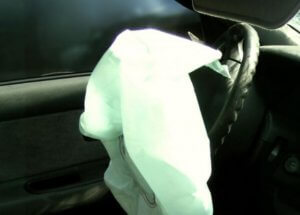Takata Inflator Linked to 10th US Death
- May 4, 2017
- Sandy
 SAN JOSE, Calif. – A high school senior following what many safety experts call a ‘minor car accident.’ Authorities at the National Highway Traffic Safety Administration say the teen bled to death as a result of a defective airbag.
SAN JOSE, Calif. – A high school senior following what many safety experts call a ‘minor car accident.’ Authorities at the National Highway Traffic Safety Administration say the teen bled to death as a result of a defective airbag.
The 17-year-old girl, driving a 2002 Honda Civic, became the 10th known fatality in the U.S. linked to defective airbags manufactured by Takata Corporation. The defects led to one of the largest auto recalls in history.
A Bay Area defective product attorney at The Barnes Firm says millions of vehicles could have faulty airbags – and many victims, like this most recent tragedy, were involved in minor crashes.
“Many victims should have been able to walk away from their accidents,” defective product attorney Landon Vivian said. “For years, this company avoided issuing recalls and as a result, many families have suffered – and they continue to suffer because of delayed recall efforts.”
According to the accident report, the teenage driver was wearing her seat belt and driving under the speed limit when she rear-ended another vehicle. The crash caused little damage to the cars but it triggered the air bags; which deployed with such an explosive force that shrapnel ripped through the air bag and slashed the teen driver’s carotid artery.
Other accidents involving Takata air bags have a similar story.
“The defective air bags use ammonium nitrate, a volatile chemical mixture that can explode like a bomb,” Vivian said. “Although it’s unstable, it’s also very cheap and unregulated.”
Takata began using ammonium nitrate for air bag inflators in 2001. Since then, the company has defended its use of the explosive material calling it “safe and effective.” However, newly published employee emails were more critical of the switch:
Many Takata employees expressed concern about “safety and quality lapses” years before Takata acknowledged the air bags were defective.
U.S. Senator Bill Nelson (D- Fla.) said a federal probe revealed that Takata was aware of “serious safety and quality control lapses” as early as 2001 but the company continued to manufacture air bags with the explosively cheap ammonium nitrate.
Takata finally issued recalls for around 24 million cars in 2013.
According to Honda, the 2002 Honda Civic that recently killed a teenage driver was indeed under recall. Honda says the vehicle’s owner was sent several notices to fix the air bags. Bay Area defective product attorneys say the recall notices followed federal regulations but the entire recall process is inefficient if not impossible.
“Millions of owners were placed on waiting lists because repair shops didn’t have the replacement parts,” Vivian said. “24 million cars are a lot to fix in a short amount of time and it caused a huge supply shortage, so only a portion of the recalled vehicles have been fixed.”
Defective air bag inflators have been linked to hundreds of other injuries and safety advocates say vehicles in hot or humid climates are more at risk to the defect due to ammonium nitrate’s delicate relationship with humidity.
The NHTSA estimates only a third of the affected vehicles have been repaired in the U.S.; that leaves millions of drivers and front seat passengers at risk.
If you or someone you know has been injured by a defective air bag or other defective car parts, contact the Bay Area personal injury attorneys at The Barnes Firm for a free case evaluation.
The Barnes Firm 1-(800) 800-0000